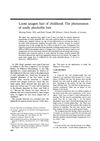
Search
for
Sort by
Research
300-330 / 1000+ results

research The Correlation Between Alopecia and Temperament in Rhesus Macaques (Macaca Mulatta) at Four Primate Facilities
Monkeys with more anxious or inhibited temperaments tend to have less hair loss.

research Behavioral Dermatology
Behavioral dermatology treats skin problems by considering both emotional and physical factors.

research Obsessive-Compulsive Skin Disorders: A Novel Classification Based on Degree of Insight
The new classification system for skin disorders emphasizes the importance of understanding a patient's awareness of their condition for better treatment.

research Photobiomodulation Therapy in Management of Cancer Therapy-Induced Side Effects: WALT Position Paper 2022
Photobiomodulation therapy helps manage cancer treatment side effects but needs more research for optimization.

research Prior Facility Affects Alopecia in Adulthood for Rhesus Macaques
Where a rhesus macaque used to live can affect its chances of getting alopecia later in life, and females are more likely to be affected than males.

research Abstracts from the 2009 Annual Meeting of the Society for Pediatric Dermatology
UVB is good for a skin condition in Asian kids, a lotion works for head lice, a drug helps with a skin blistering disorder, a foam reduces itchiness in skin inflammation, birthmarks can be more widespread, and criteria for a neurocutaneous disorder were agreed upon.

research Ethnic Hair Update: Past and Present
Dermatologists need to understand African American hair-care practices to better treat their hair and scalp disorders.

research Current and Novel Methods for Assessing Efficacy of Hair Growth Promoters in Pattern Hair Loss
New methods improve how we test hair growth treatments, but challenges like slow hair changes and high costs remain.

research Llama Dermatology
Llamas often have skin issues like mange, bacterial infections, and allergies, with some treatable by zinc.

research Sebaceous Immunobiology: Skin Homeostasis, Innate Immunity Coordination, Inflammatory Response, and Disease Associations
Sebaceous glands play a key role in skin health, immunity, and various skin diseases.
research Controlled Delivery of T-box21 Small Interfering RNA Ameliorates Autoimmune Alopecia in a C3H/HeJ Mouse Model
Controlled delivery of specific RNA and IL-4 restored hair growth in mice with autoimmune alopecia.

research Vitamin D in Dermatology and Cosmetology
Vitamin D is crucial for skin health and managing skin diseases.

research Tight Junction Barriers in Human Hair Follicles – Role of Claudin-1
Claudin-1 is important for the barrier function and growth of hair.

research British Hair and Nail Society Findings on Hair and Nail Disorders
Men with a certain type of hair loss often use facial moisturizers, and a specific antibiotic treatment may help another hair condition.

research Loose Anagen Hair of Childhood: The Phenomenon of Easily Pluckable Hair
Children with loose anagen hair have easily pluckable hair due to root sheath problems, and it might improve without treatment.

research Reassessing Frontal Fibrosing Alopecia
Frontal Fibrosing Alopecia is a slowly progressing hair loss condition, likely underdiagnosed, with ineffective treatments, needing more research to understand it fully.

research Parkinson's Disease and Skin Disorders: Non-Iatrogenic and Iatrogenic Connections
Parkinson's disease is linked to skin disorders and skin cells help in studying the disease.

research Footprints of the EADV: A Meeting Report from the 17th Congress of the European Academy of Dermatology and Venereology
The conference highlighted new dermatological treatments and emphasized early intervention and addressing conditions lacking evidence-based treatments.
research Netherton's Syndrome: A Syndrome of Elevated IgE and Characteristic Skin and Hair Findings
Netherton's syndrome is linked to high IgE levels and unique skin and hair symptoms, and may improve with ammonium lactate lotion and allergy management.

research Review: Topical Minoxidil for Male Pattern Baldness
Minoxidil helps hair growth and boosts self-esteem in balding men.

research Hair and Scalp Disorders in Women of African Descent
Afro-textured hair is more fragile and prone to certain scalp conditions, requiring careful treatment and more research for effective management.

research The Role of Lymphocytes in the Development and Treatment of Alopecia Areata
Lymphocytes, especially CD8+ T cells, play a key role in causing alopecia areata, and targeting them may lead to new treatments.

research Dermatological Manifestations of Stress in Normal and Psychiatric Populations
Stress can worsen skin conditions and affect mental health, so doctors should include stress management in skin treatment.

research Hair Loss in Children in South-East Nigeria: Common and Uncommon Cases
The most common causes of hair loss in children in South-East Nigeria are fungal infections and alopecia areata.

research Profile Analysis of Adverse Events After Boron Neutron Capture Therapy for Head and Neck Cancer: A Sub-Analysis of the JHN002 Study
Boron neutron capture therapy for head and neck cancer can cause side effects like mouth sores and skin irritation, which vary depending on where the treatment is aimed.

research Prevalence of Skin Diseases in Livestock in New Valley Governorate, Egypt
Over 30% of livestock in New Valley Governorate, Egypt, had skin diseases, affecting their productivity and income.

research The Spectrum of Nephrocutaneous Diseases and Associations
Skin doctors should know about skin and kidney disease links to prevent serious kidney problems.

research Focus on Skin as a Possible Port of Entry for Solid Nanoparticles and the Toxicological Impact
Nanoparticles can enter the skin, potentially causing toxicity, especially in damaged skin.

research Psychocutaneous Diseases: A Review of Psychiatric Disorders with Skin Manifestations and Their Prevalence in Dermatological Settings
Many skin patients have mental health issues, but few dermatologists are well-versed in treating these conditions.